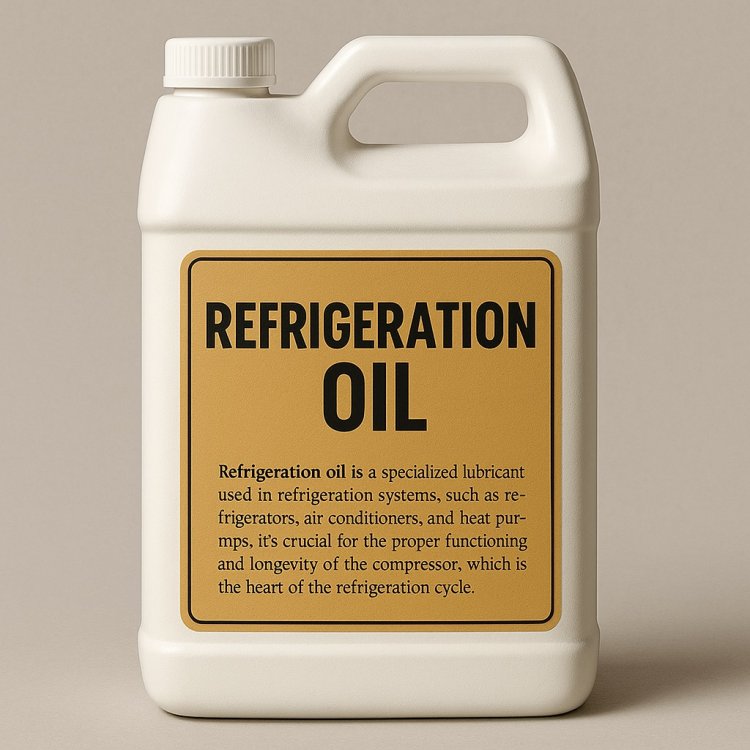Refrigeration Oil Market Size, Share, Trends & Forecast 2025-2035
Explore the global refrigeration oil market, including size, share, trends, growth drivers, segmentation, regional analysis, and competitive landscape. Forecasts up to 2035.

Key Takeaways
- The global refrigeration oil market is valued at USD 1.45 billion in 2024 and is projected to reach USD 2.3 billion by 2035.
- The market is expected to grow at a CAGR of 4.30% from 2025 to 2035.
- Refrigeration oil is essential for the efficient operation and longevity of compressors in refrigeration systems.
- Market growth is driven by rising demand for refrigeration and air conditioning in residential, commercial, and industrial sectors.
- Technological advancements and the shift towards eco-friendly refrigerants are shaping market trends.
- Asia-Pacific is the leading region, with North America and Europe also showing significant growth.
- The market is highly competitive, with key players focusing on innovation and sustainability.
Market Overview
The refrigeration oil market is experiencing robust growth, fueled by the increasing demand for refrigeration and air conditioning systems across the globe. Refrigeration oil, a specialized lubricant, plays a pivotal role in ensuring the smooth operation and durability of compressors—the core component of any refrigeration cycle. As the world becomes more urbanized and industrialized, the need for efficient cooling solutions in residential, commercial, and industrial applications is surging. This, in turn, is propelling the demand for high-quality refrigeration oils that can withstand extreme temperatures and pressures while maintaining compatibility with modern refrigerants.
The market, valued at USD 1.45 billion in 2024, is projected to reach USD 2.3 billion by 2035, growing at a steady CAGR of 4.30%. This growth is underpinned by several factors, including the expansion of the food and beverage industry, the proliferation of supermarkets and cold storage facilities, and the rising adoption of air conditioning in emerging economies. Additionally, the push towards energy-efficient and environmentally friendly refrigeration systems is prompting manufacturers to develop advanced refrigeration oils that meet stringent regulatory standards. As a result, the market is witnessing a wave of innovation, with companies investing in research and development to create products that offer superior performance, longer service life, and reduced environmental impact.
Get a Sample Copy:- https://www.vantagemarketresearch.com/refrigeration-oil-market-1784/request-sample
Market Segmentation Analysis
The refrigeration oil market can be segmented based on oil type, refrigerant type, application, and region. By oil type, the market is divided into mineral oil, synthetic oil, and others. Synthetic oils, such as polyolester (POE) and polyalkylene glycol (PAG), are gaining traction due to their superior thermal stability and compatibility with new-generation refrigerants. In terms of refrigerant type, the market is segmented into chlorofluorocarbons (CFCs), hydrofluorocarbons (HFCs), hydrocarbons, and natural refrigerants. The shift towards low-global warming potential (GWP) refrigerants is influencing the choice of refrigeration oils, with synthetic oils emerging as the preferred option.
Application-wise, the market covers residential, commercial, and industrial sectors. The commercial segment, which includes supermarkets, cold storage, and food processing, accounts for a significant share of the market, driven by the need for reliable and efficient cooling solutions. Regionally, Asia-Pacific dominates the market, followed by North America and Europe, reflecting the rapid urbanization and industrialization in these regions.
Drivers
Several factors are driving the growth of the refrigeration oil market. The foremost driver is the increasing demand for refrigeration and air conditioning systems, particularly in emerging economies where rising incomes and urbanization are fueling the adoption of modern appliances. The expansion of the food and beverage industry, coupled with the need for efficient cold storage and transportation, is also boosting market growth. Furthermore, the trend towards energy-efficient and environmentally friendly refrigeration systems is prompting manufacturers to develop advanced oils that enhance system performance and reduce energy consumption.
Restraints
Despite the positive outlook, the refrigeration oil market faces certain challenges. One of the primary restraints is the volatility in raw material prices, which can impact the cost and availability of refrigeration oils. Additionally, the transition to new refrigerants, driven by environmental regulations, poses compatibility issues with existing oils, necessitating the development of new formulations. The high cost of synthetic oils compared to mineral oils may also limit their adoption, particularly in price-sensitive markets.
Growth Factors
The refrigeration oil market is poised for significant growth, thanks to several key factors. The ongoing shift towards eco-friendly refrigerants, such as hydrofluoroolefins (HFOs) and natural refrigerants, is creating new opportunities for oil manufacturers to develop compatible and sustainable products. Technological advancements in compressor design and refrigeration systems are also driving demand for high-performance oils that can operate efficiently under varying conditions. Moreover, the increasing focus on energy efficiency and regulatory compliance is encouraging end-users to upgrade their systems with advanced oils that offer better lubrication, reduced wear and tear, and longer service intervals.
Another important growth factor is the rising awareness about the importance of preventive maintenance in refrigeration systems. As businesses and consumers seek to minimize downtime and extend the lifespan of their equipment, the demand for high-quality refrigeration oils is expected to rise. The growth of the e-commerce sector and the expansion of cold chain logistics are further contributing to market expansion, as they require reliable and efficient refrigeration solutions to ensure the safe storage and transportation of perishable goods.
Emerging Trends
The refrigeration oil market is witnessing several emerging trends that are shaping its future trajectory. One notable trend is the increasing adoption of synthetic oils, which offer superior performance and compatibility with modern refrigerants. The shift towards low-GWP and natural refrigerants is also influencing product development, with manufacturers focusing on creating oils that are environmentally friendly and compliant with global regulations. Digitalization and the use of smart technologies in refrigeration systems are driving the demand for oils that can support advanced monitoring and predictive maintenance capabilities. Additionally, the growing emphasis on sustainability and circular economy principles is prompting companies to explore bio-based and recyclable oil formulations.
Regional Analysis
Regionally, the Asia-Pacific market leads the global refrigeration oil industry, driven by rapid industrialization, urbanization, and the expansion of the food and beverage sector. Countries like China, India, and Japan are witnessing a surge in demand for refrigeration and air conditioning systems, which is boosting the consumption of refrigeration oils. North America and Europe are also significant markets, characterized by stringent environmental regulations and a strong focus on energy efficiency. In these regions, the adoption of advanced refrigeration systems and the transition to eco-friendly refrigerants are driving the demand for high-performance oils. Latin America and the Middle East & Africa are emerging as promising markets, supported by growing investments in infrastructure and the expansion of the cold chain logistics sector.
Competitive Landscape
The refrigeration oil market is highly competitive, with several global and regional players vying for market share. Key companies in the market include ExxonMobil, Shell, BASF, Idemitsu Kosan, FUCHS Petrolub, and CPI Fluid Engineering, among others. These players are focusing on product innovation, strategic partnerships, and mergers and acquisitions to strengthen their market position. The emphasis is on developing oils that are compatible with new-generation refrigerants, offer superior performance, and meet stringent environmental standards.
Innovation is a key differentiator in the market, with companies investing heavily in research and development to create advanced formulations that address the evolving needs of end-users. Sustainability is also a major focus, with leading players exploring bio-based and recyclable oils to reduce their environmental footprint. The competitive landscape is further characterized by collaborations between oil manufacturers and refrigeration system OEMs to develop integrated solutions that enhance system efficiency and reliability. As the market continues to evolve, companies that can offer high-quality, sustainable, and cost-effective products are likely to gain a competitive edge.
Recent Developments in Refrigeration Oil Market
- ExxonMobil launched a new range of synthetic refrigeration oils compatible with low-GWP refrigerants.
- BASF announced the development of bio-based refrigeration oils to meet sustainability goals.
- FUCHS Petrolub expanded its production capacity in Asia to cater to the growing demand.
- Idemitsu Kosan entered into a strategic partnership with a leading compressor manufacturer to develop customized oils.
- CPI Fluid Engineering introduced smart oil monitoring solutions for predictive maintenance in refrigeration systems.
Market Segmentation
| Parameter | Details | |
|---|---|---|
| Segment Covered |
|
|
| Regions & Countries Covered |
|
|
| Companies Covered |
|
|
| Report Coverage | Market growth drivers, restraints, opportunities, Porter’s five forces analysis, PEST analysis, value chain analysis, regulatory landscape, technology landscape, patent analysis, market attractiveness analysis by segments and North America, company market share analysis, and COVID-19 impact analysis | |
| Pricing and purchase options | Avail of customized purchase options to meet your exact research needs.Explore purchase options |
FAQs
- What is refrigeration oil and why is it important?
- What are the key drivers of the refrigeration oil market?
- How is the market segmented by oil type and application?
- What are the major challenges facing the refrigeration oil market?
- Which regions are leading the market growth?
- What are the emerging trends in the refrigeration oil industry?
- How are environmental regulations impacting the market?
- Who are the major players in the refrigeration oil market?
- What is the future outlook for the refrigeration oil market?
- How is the shift towards eco-friendly refrigerants influencing product development?


















